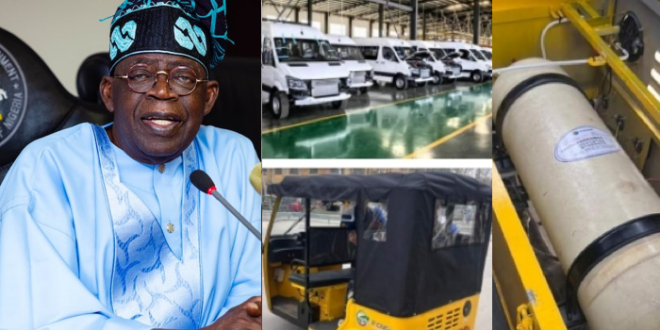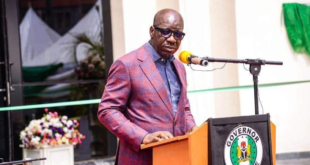The Federal Government of Nigeria has announced plans to launch and deploy Compressed Natural Gas (CNG) vehicles for mass transit, marking a significant milestone in the nation’s transportation sector.
This initiative, spearheaded by President Bola Tinubu, aims to provide cheaper, safer, and more climate-friendly energy solutions.
Scheduled to commence in May, the project aligns with the government’s efforts to cushion the effect of fuel price increases on the masses.
With a budget of N100 billion, the government has allocated funds for the purchase of 5,500 CNG vehicles, including buses and tricycles, alongside 100 electric buses and over 20,000 CNG conversion kits.
This move is part of a broader effort to spur the development of CNG refilling stations and electric charging stations across the country.
The Presidential CNG Initiative (PCNGI), led by Michael Oluwagbemi, has been instrumental in laying the groundwork for this transition.
The committee has secured over $50 million in actual investments from private sector partners, facilitating the establishment of refuelling stations, conversion centres, and mother stations.
A safety policy document, comprising 80 standards and regulations, has been developed to ensure the safe and reliable conversion of vehicles to run on CNG.
President Tinubu’s administration aims to phase out the use of diesel and petrol in favor of natural gas, a resource abundant in at least 30 of Nigeria’s 36 states.
This shift is expected to significantly reduce air pollution and align Nigeria’s commitment to meeting its nationally determined contributions (NDCs) under the Paris Climate Accord.
Four assembly plants, located across the country, are involved in the production of the CNG buses, with JET already assembling 200 units.
Additionally, electric vehicles will be produced by Brilliant EV to cater to states without access to CNG.
Over 600 buses are targeted for production in the first phase, while a new plant on the Lagos-Ibadan Expressway will focus on assembling thousands of CNG tricycles.
The government has enlisted the support of NIPCO and BOVAS to offer refilling services and conversion centres, with plans to establish 32 CNG stations nationwide.
NNPC Limited, which has previously launched an on-and-off CNG initiative, is also joining this new effort.
The PCNGI is collaborating with 22 other agency partners, including the Standards Organisation of Nigeria (SON) and Nigeria Automotive Design and Development Council (NADDDC), to ensure the successful implementation of this ambitious project.
President Tinubu’s vision to deploy one million natural gas-propelled vehicles by 2027 signifies a major energy transition in Nigeria’s transportation industry.
This initiative is not only expected to provide cheaper, safer, and more climate-friendly energy solutions but also stimulate job creation and economic growth.
The success of this project hinges on the collaboration between the government and the private sector, including transport unions and financiers.
With Nigeria poised to become a leading nation in the adoption of CNG vehicles, the country is set to make significant strides in achieving its environmental and economic goals.
Subscribe to the Advocate News letter and receive news updates daily in your inbox.
 Advocate.ng Latest news update on politics, entertainment, sport and more
Advocate.ng Latest news update on politics, entertainment, sport and more




